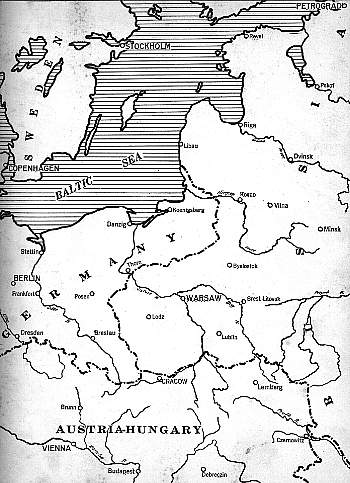Korzybski: A Biography (Free Online Edition)
Copyright © 2014 (2011) by Bruce I. Kodish
All rights reserved. Copyright material may be quoted verbatim without need for permission from or payment to the copyright holder, provided that attribution is clearly given and that the material quoted is reasonably brief in extent.
Probably sometime late in October or in early November, Alfred happened to bump into Captain Sobanski, another friend from the front and a fellow Pole. Alfred told him about his frustrations with the war, with the ineptness of the Russian army, with the inability of Russian industry to provide adequate ammunition and supplies, and with the Tsar and his regime. He felt utterly disgusted.
Sobanski, an engineer, told him about a Russian Military Commission forming. About 200 technical experts were being sent to America to supervise the manufacture and testing of ammunition for the Russian Army. Sobanski was going as a “Senior Inspector”. He suggested Korzybski visit Colonel Moisiev who was organizing the project. Korzybski went to see the Colonel as soon as he could, presented his credentials, and asked for a job. Moisiev immediately accepted Korzybski, though he apologized that the best paying jobs had already been taken. Alfred didn’t care. He was appointed “Junior Inspector”. Their ship was scheduled to leave shortly. (According to Korzybski’s 1915 pocket calendar they sailed from Petrograd on November 17.)
Korzybski needed to get his affairs arranged, i.e., officially resign from his military appointment, obtain a passport, and get his travel stipend:
Notes
Probably sometime late in October or in early November, Alfred happened to bump into Captain Sobanski, another friend from the front and a fellow Pole. Alfred told him about his frustrations with the war, with the ineptness of the Russian army, with the inability of Russian industry to provide adequate ammunition and supplies, and with the Tsar and his regime. He felt utterly disgusted.
Sobanski, an engineer, told him about a Russian Military Commission forming. About 200 technical experts were being sent to America to supervise the manufacture and testing of ammunition for the Russian Army. Sobanski was going as a “Senior Inspector”. He suggested Korzybski visit Colonel Moisiev who was organizing the project. Korzybski went to see the Colonel as soon as he could, presented his credentials, and asked for a job. Moisiev immediately accepted Korzybski, though he apologized that the best paying jobs had already been taken. Alfred didn’t care. He was appointed “Junior Inspector”. Their ship was scheduled to leave shortly. (According to Korzybski’s 1915 pocket calendar they sailed from Petrograd on November 17.)
Korzybski needed to get his affairs arranged, i.e., officially resign from his military appointment, obtain a passport, and get his travel stipend:
I immediately got something like $3000 or more—dollars, not rubles—in cash. Cash in hand for the travel to the United States and back. Can you imagine traveling from Petrograd to New York $3000, and say $200 for round trip. Is that a crazy price? You know how they calculated? I was entitled to four horses and the mileage between Petrograd and New York was calculated on the price of horses. Mileage by horses and I was supposed to have four horses. Do you follow the idiocy of it? So the trip was calculated on the basis of four horses and the legal cost of four Russian horses by the mile amounted to $3200 or so. So I got the money—can you imagine what was the relief of being free of the [Tsar], hav[ing] a huge amount of money in cash, as it was in rubles…7000 rubles or so. Unheard of money. Of course, idiotic all through, granted. So finally I got the money in dollars and passport and everything. And sailing in three days, five. And what I did, I wanted to pay the 100 [rubles] back to that kind general...who lent me the 100 [rubles]. And I paid 100 [rubles] for some beautiful ivory snuff-box with diamonds and I don’t know what-not. All antique or some such. And I put the 100 rubles in it, and I saw the general and thanked him so much for his trying to help me and I paid the money that way. It means a 100 [ruble] box of some sort with 100 [rubles] inside. (8)
Then, as he put it, “I resigned from my former appointments and sailed in a few days, deciding to have an educational trip, which I did.”(9)
 |
| Eastern Front-North with pre-war borders shown, (Petrograd shown in far upper right corner) |
Notes
You may download a pdf of all of the book's reference notes (including a note on primary source material and abbreviations used) from the link labeled Notes on the Contents page. The pdf of the Bibliography, linked on the Contents page contains full information on referenced books and articles.
8. Korzybski 1947, p. 152–153.
9. AK to V. Molodoy, Unsent letter, 12/16/1924. AKDA 15.733.
No comments:
Post a Comment